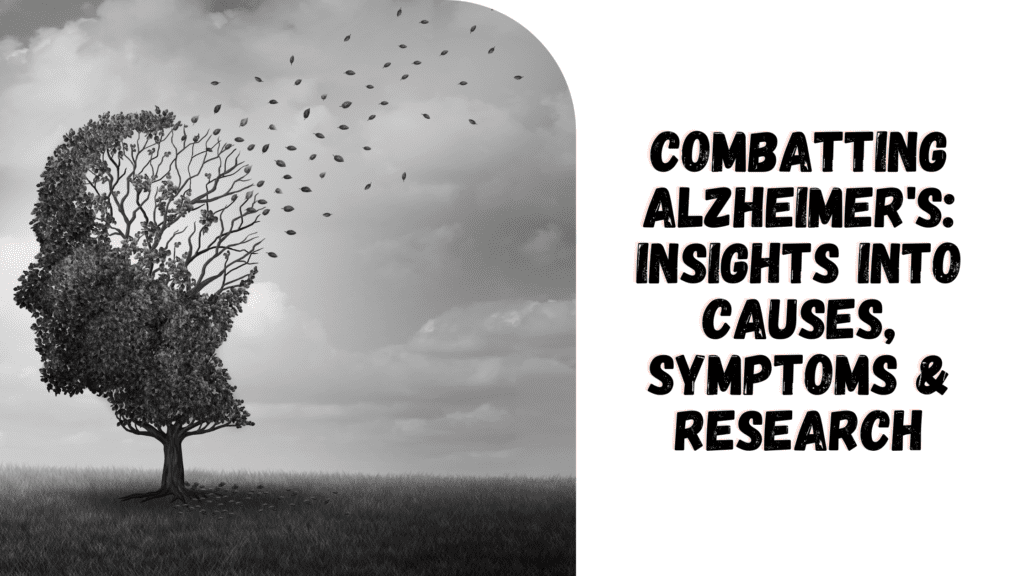Combatting Alzheimer’s: Insights into Causes, Symptoms & Research

Table of Contents
What is Alzheimer’s Disease?
Ah, Alzheimer’ Disease. No, it’s not the name of that distant relative who always forgets your birthday (though, wouldn’t that be ironic?). It’s a term that has become synonymous with memory loss and, unfortunately, affects millions worldwide. Let’s dive deep into the world of this mysterious ailment, shall we?
The Basics: A Brief Overview
Alzheimer’s disease is a progressive neurodegenerative disorder that affects memory, thinking, and behaviour. It’s like that one mischievous sock that always goes missing from the laundry – except, in this case, it’s our precious memories that seem to vanish. The disease primarily affects older adults, but early-onset Alzheimer’s can strike those in their 40s or 50s. And trust me, it’s not just about forgetting where you left your keys or the name of that movie with the guy from that thing. It’s far more profound and, frankly, a bit more sinister.
The Science-y Stuff: What’s Happening in the Brain?
Alright, put on your lab coats and adjust your geeky glasses, because we’re about to get a tad scientific. The human brain is a complex organ, filled with billions of neurons that communicate through synapses. In Alzheimer’s, two main culprits wreak havoc: amyloid plaques and tau tangles. Think of them as the villains in a superhero movie, except there’s no dashing hero to save the day (yet!).
Amyloid plaques are sticky clumps of protein that build up between neurons, while tau tangles are twisted fibres that form inside brain cells. Over time, these villains damage and kill neurons, leading to the symptoms we associate with Alzheimer’s. It’s like a garden overrun by weeds, choking out the beautiful flowers.
The Heartbreak: Symptoms and Progression
Now, let’s talk about the elephant in the room – or rather, the forgetful elephant. Alzheimer’s doesn’t just pop up overnight. It’s sneaky, starting with mild memory lapses and progressing to severe cognitive impairment. Early signs might include forgetting recent conversations or misplacing items frequently. As the disease advances, individuals may struggle with tasks like dressing, eating, or even recognizing loved ones. It’s a heart-wrenching journey, not just for the affected individual but for their families as well.
The Silver Lining: Research and Hope
But it’s not all doom and gloom! Scientists and researchers are working tirelessly to understand Alzheimer’s better and develop treatments. There’s a plethora of research, some of which focuses on early detection, while others aim to find a cure. And while we might not have a magic pill (yet!), there are medications and therapies that can help manage symptoms. So, chin up! The future is looking brighter.
For the moment, it’s about supporting the individuals and their loved ones affected by memory loss and maintaining the memory function for as long as possible.
Adopting a healthy by lifestyle also helpa manage the condition.
Conclusion
Alzheimer’s is a complex and challenging disease, but understanding it is the first step towards combating it. With ongoing research and the resilience of the human spirit, there’s hope on the horizon. And while we might crack a joke or two to lighten the mood, the seriousness of the situation isn’t lost on us. Together, we can raise awareness, support affected individuals, and hope for a world free from the clutches of Alzheimer’s.
References
- Alzheimer’s Society UK: https://www.alzheimers.org.uk/
- A leading charity in the UK for people affected by dementia.
- NHS – Alzheimer’s Disease: https://www.nhs.uk/conditions/alzheimers-disease/
- Official NHS page providing detailed information on Alzheimer’s.
- Alzheimer’s Research UK: https://www.alzheimersresearchuk.org/
- The UK’s leading Alzheimer’s research charity focused on finding cures and treatments.
FAQs
1. Is Alzheimer’s hereditary? While there’s a genetic component to Alzheimer’s, it doesn’t mean you’ll automatically get it if a family member has it. However, having a close relative with the disease does increase your risk.
2. Are there any preventive measures for Alzheimer’s? While there’s no surefire way to prevent Alzheimer’s, leading a healthy lifestyle, staying mentally and socially active, and managing health conditions like diabetes or hypertension can reduce the risk.
3. How is Alzheimer’s diagnosed? Diagnosis involves a combination of medical assessments, including neurological exams, mental status tests, and brain imaging
THANK YOU
We appreciate your commitment to educating yourself about Alzheimer’s by reading our article; recognizing the importance of this aspect of health is truly crucial.
We’re here to provide you with the information you need. We invite you to explore our diverse collection of Blogs posts for more insightful perspectives on topics that matter to you. From in-depth articles on health and wellness to enlightening pieces on current global issues, we strive to bring you content that informs, inspires, and engages.
Disclaimer: Please note our blogs are for informational purposes only and do not substitute for professional medical advice. Please consult us at ExtracellularTM or your doctor for further advice.























































0 Comments